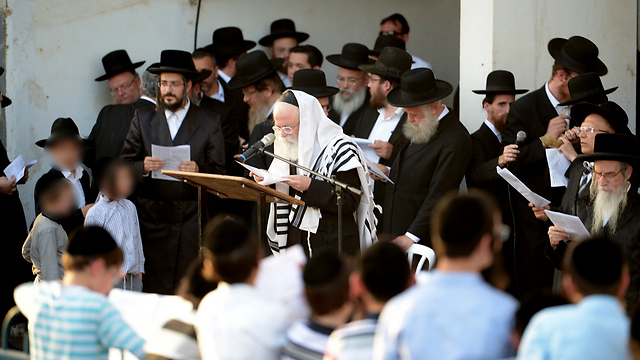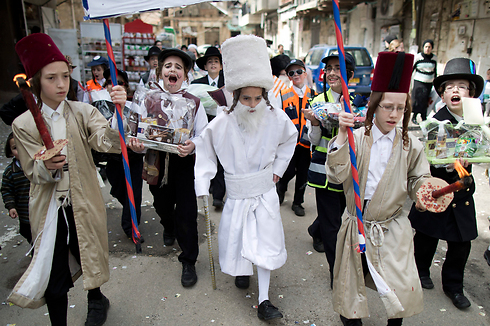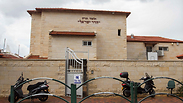
An ultra-Orthodox school. An education gap (Photo: Ido Erez)
צילום: עידו ארז
Former ultra-Orthodox Jews demand basic education
Israel's government asked to make changes to education policy, allowing children studying in insulated haredi education system to learn subjects like math and English.
When Avihay Marciano completed his schooling, he didn't know how to use a computer or speak English and had only elementary math skills. Now, Marciano and 50 others who left the insular ultra-Orthodox community are suing the state, claiming they were denied a basic education and left lagging far behind secular Israelis.
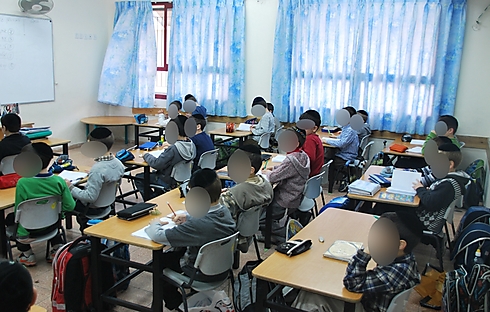
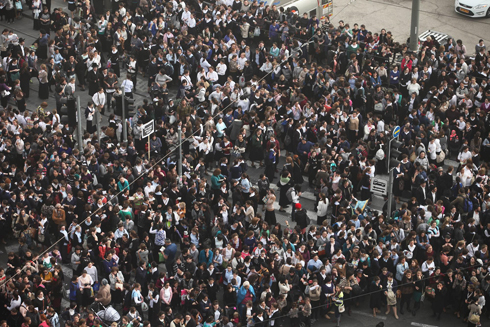
The case has shined a light on Israel's separate education system for the ultra-Orthodox, which experts say is keeping a sizeable chunk of Israelis from integrating into the workforce and is a ticking time bomb for the country's long-term economic health.

Ultra-Orthodox schoolchildren. Hardly any education in math, science, or English (Photo: Yoav Friedman) (צילום: יואב פרידמן)
"The state has abandoned us," said Marciano, 26. "I sat for years in a yeshiva, I studied day and night, and at the end of the day I was left empty-handed."
Israel's cloistered but politically powerful ultra-Orthodox community has for decades maintained a separate education system, where boys and girls study holy texts and secular studies take a distant back seat. Boys study secular subjects less than their non-Orthodox peers and only through seventh grade. Girls spend more time on secular studies, but aren't taught skills needed for work.
The government, historically dependent on ultra-Orthodox kingmakers to form government coalitions, allowed the community to establish the separate, state-funded school system. It also gives generous welfare payments to thousands of ultra-Orthodox men who shun work, spending their days instead immersed in religious study.
Steep unemployment, believed to hover around 50 percent, coupled with a high birthrate has fueled deep poverty among the ultra-Orthodox as well as bitterness among the secular Jewish majority. With families of eight to 10 children commonplace, more than a quarter of all Israeli first graders today are ultra-Orthodox.
They make up about 10 percent of Israel's 8 million citizens and are among the country's fastest-growing populations. Their numbers are expected to swell to more than a quarter of the population by 2059, according to the Shoresh Institution, a think tank.
The lawsuit includes 53 plaintiffs, all educated under the ultra-Orthodox system but who have since become secular and don't have the skills to earn a university degree or find a decent paying job. In the secular world, these young adults are often shunned by their parents and are forced to fend for themselves financially while studying.
They are demanding that the state compensate them for their struggle to catch up to other Israelis. They also want the state to create and fund a program for Israelis who leave the Orthodox world, estimated to number between hundreds and tens of thousands, allowing them to fill in their educational gap. Such a program currently exists for ultra-Orthodox men and women who have remained in the community but want to beef up their educational credentials.
Marciano said he spent more than two years trying to brush up on his studies, one working full-time so he could finance his education and the other studying physics and math. At 26, Marciano is finally pursuing a university degree in computer science and communications.
Yossi Klar, a spokesman for Out for Change, the group leading the lawsuit, said the state shirked its responsibility to provide a basic education to all.
"If they want to go study and make a living, without math and English and basic subjects, it's very difficult. And the state is aware of this and chooses to ignore it because of political pressure," said the 23-year-old Klar, who is now completing courses so he can attend university.
The ultra-Orthodox fiercely oppose attempts at reform. A law passed by the previous government to speed up ultra-Orthodox enlistment into Israel's military, from which many were exempt from compulsory service, is slowly being undone by the current government, which is propped up by two ultra-Orthodox parties. Greater participation in the military is seen by many as a way to fast track the ultra-Orthodox into the workforce.
Experts have long warned that a separate education system and the absence of the ultra-Orthodox in the workforce threaten Israel's long-term economic prospects.
"If we'll leave the situation as it is, when these people are not being educated, they are not contributing enough to Israeli security and to Israeli society, and to Israeli economy, we are facing quite a problem in the near future," said Yedidia Stern, an expert on religion and state at the Israel Democracy Institute think tank. He called the plight of the former ultra-Orthodox a "tragedy," saying they are forced to start their lives "not from zero but from minus."
Ultra-Orthodox leaders say any changes to the inward-looking education system would threaten a centuries-old way of life and disrupt a tradition that has served as the very bedrock of Judaism for thousands of years. Ultra-Orthodox legislators declined to comment.

An Ultra-Orthodox protest against enlistment. Education reform is also likely to spark resistance (Photo: Gil Yohanan) (צילום: גיל יוחנן)
Shmuel Poppenheim, an ultra-Orthodox activist, said the case could force the community to ask itself tough questions about the way it educates its children.
"We are saying that we are teaching values, a conservative way of life, tools that will bring a person to the heights of traditional Jewish morals and values. And all of a sudden there is a public, a large community of people that is saying that the values we are talking about don't help them," he said. "It's a dilemma."
The Education Ministry was expected to file a response to the lawsuit in the coming weeks, likely sending it to court.
Klar said he expects the lawsuit will face vehement opposition from ultra-Orthodox leaders. But he said helping ultra-Orthodox youth study secular subjects can only benefit Israeli society.
"If it will teach English and basic studies to people who are interested to go out into the workforce, they could go out and earn a living respectably and become productive citizens," said Klar. "Give people the tools they need so they won't be poor."










